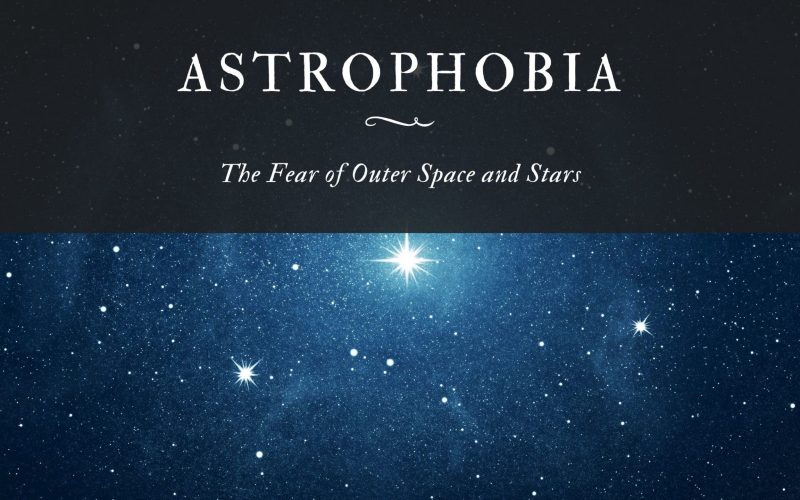For many humans, the mysteries of outer space remain a wonder. Many marvel at its beauty and uniqueness; however, it’s a big nightmare for others.
When a person has a severe and irrational fright of stars and space, the person can be said to have astrophobia.
The word astrophobia comes from two Greek words, “Astro,” meaning “Stars,” and “Phobos,” meaning “deep aversion or fear.”
Astrophobia is part of the many specific phobias that there are, and just like other phobias, when people who have this fear are exposed to their triggers, they have a case of extreme anxiety, which can lead to a full-blown panic attack.
For some, they may not be scared of stars. However, when they think of outer space and the fact that aliens can come from there(although they know it may not be true), they begin to experience symptoms of anxiety.
Such people get mentally affected when they see movies related to space, read books about outer space, or engage in discussions about outer space. For some people, astrophobia can be linked to nyctophobia, which is the fear of the dark.
This means that people with astrophobia may also be afraid of the night.
Causes of Astrophobia
Focusing on the phobia alone without knowing its causes can result in the continuance of it.
However, once you know what causes a particular phobia, you as an individual are in a better position to resolve the internal problems that can cause other subsequent attacks or other phobias.
Unfortunately, as in the case of other phobias, astrophobia is caused as a result of a combination of many factors. Scientists believe that many factors come together to play different roles in treating anxiety disorders.
Below are several possible factors that can cause astrophobia.
1. Past traumatic events
As seen in Ataxophobia, most phobias, including astrophobia, are caused as a result of a traumatic event that may have happened in the past, especially in their childhood.
As a child, seeing certain things unfold before your eyes or seeing them in a movie can cause fear so deep within the child that it can cause some health and mental challenges.
As a child who may have seen news or movies about astronauts who may have died or become stranded in space, such as “the Apollo 13 story,” which left parents and children shocked and scared, becoming scared of what you have seen is just as expected.
2. The media
Are you surprised that we would consider the media a part of the causes of this phobia? Well, it is indeed true.
Some books and movies that have been produced have projected the outer space in a bad light and, as such, getting people genuinely scared, and it can, in turn, lead to anxiety attacks when they come in contact with anything that has to do with the outer space.
Many movies and books out there talk about alien invasions, which can, in turn, escalate the fear. Some people who are even engaged in the production of the movie or the book eventually become victims of astrophobia.
For example, a lone woman astronaut who acted in the movie “Gravity” says she hates outer space, and she portrays a character stranded in space after a storm destroys her shuttle and kills her remaining crew in the space shuttle.
Movies like this can make anyone scared, and for some people, this fear can take deep root, especially when the person has the genetics or family history for mental disturbances and psychological problems.
3. Parental influences
Exposing children to some talks and discussions at an early age can tamper with their mental stability and trigger phobias such as this.
Once you, like an anxious parent or a caregiver, begin to fill a child’s head with wild thoughts and imaginations, thinking you are doing more good than harm, you will end up scarring your child.
Truth is the human brain that takes what it is given and projects it in one hundred possible ways. Hence, when you give a child a fearful detail about an event of space, the child’s brain grabs it and escalates it. Over the years, what started as a story or a piece of advice can become a deep-rooted Astrophobia.
4. Chemical imbalances
Some people have chemical imbalances, and that can make them more prone to the development of specific phobias, including astrophobia.
5. Genetics
Genetics has a role to play in the development of astrophobia and other specific phobias. Once you are predisposed to getting astrophobia, getting exposed to the triggers causes the development of anxiety and panic attacks causing astrophobia to occur.
Symptoms of Astrophobia
One major thing you must understand when dealing with astrophobia is that it is a specific phobia.
People who have astrophobia don’t just casually hate anything related to space and stars; they have persistent fear and anxiety whenever they even think about it.
Sometimes, people who have astrophobia tend to have panic attacks whenever they are close to their triggers, and this can cause a disruption in their health and daily lifestyle. The symptoms of astrophobia are similar to t that of other phobias, and they include:
1. Shortness of breath
When a person suffering from astrophobia is close to anything related to space or stars, the person will experience sudden tightness in his/her chest and intense difficulty breathing.
2. Anxiety
The person will begin to have sweaty palms and forehead, uneasiness, and possible visible tremors. These are all possible signs of anxiety.
3. Trembling
The patient might be seen to be visibly shaking when he or she comes in contact with his or her triggers. This may be seen before the patient goes into a full-blown panic attack.
4. Panic attacks
The patient can experience insecurity and panic in a perfectly safe area and, as such, go into a full-blown panic attack.
5. Rapid heartbeat
Rapid heartbeat often goes hand in hand with panic attacks. Other symptoms may include sweating, hot flashes, cold flashes, shaking, crying, and screaming.
They may likely experience the tendency always to want to run away when exposed to anything related to space or stars, dizziness, fear of being entirely disconnected or losing touch with reality, fatigue, nausea, lack of appetite, and vomiting.
Treatment
Just like other types of phobia, astrophobia is first a mental issue that can quickly become a health problem. As such, it is usually treated under the supervision of a professional therapist or psychiatrist.
The treatment is first to help disseminate the patient’s negative thoughts toward outer space, the stars, and the galaxy. Listed below are a few remedies that are often offered to those who suffer from astrophobia.
1. Cognitive Behavioural Therapy(CBT)
Cognitive Behavioral Therapy, often known as CBT, is one of the most common treatments used in helping patients deal with phobias, and it has been seen to be quite useful. In this kind of treatment, the doctor helps the patient gradually change how they think and see things, especially concerning their fears.
It is a step-by-step process that may take a while; however, it has been proven effective when treating astrophobia. The therapist teaches them how to counteract their fears with positive thoughts.
2. Desensitization and exposure therapy
This is a branch of CBT. This involves gradually exposing the patient to their fears and help them face it one by one.
The theory is that “the more you are exposed to your fear, the more you learn to control your fear, and slowly and over time, your fear diminishes.”
However, this exposure is usually done under supervision, and it is controlled.
3. Hypnotherapy
This method is usually done under extreme circumstances after all other therapies seem not working.
Hypnotherapy usually involves hypnosis in which the patient is sent into a deep state of relaxation, and as such, the person’s mind is open to receiving positive thoughts and suggestions.
The patient listens and adapts to whatever he or she is told during this session and walks with it for a long time.
4. Self-help
Self-help means you, as the patient, doing something to help yourself out of your fear. It can include writing down your fears on a sheet, and for every concern you write down, you write a countering positive thought.
Also, meditation, deep breathing, and visualization have been seen to be effective methods to help reduce the effects of astrophobia.
If you know someone who has astrophobia or you have it, we advise that you see a therapist. Talking to someone about your fears is not a sign of weakness; instead, it is a sign of strength, as it shows you are no longer running but are ready to face your fears head-on.
Talk to a licensed, competent therapist who is capable of helping you stop suffering in the most friendly way possible.
References;
- Fear of Stars and Outer Space Phobia – Astrophobia; Fearof
- Dealing with the Fear of Outer Space or Astrophobia; Medium
- Coping With Astrophobia or the Fear of Outer Space; Verywellmind








